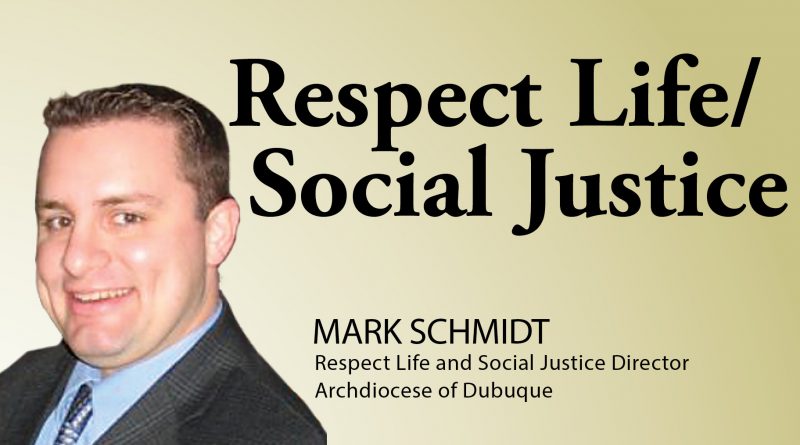Gun safety laws and the church’s teaching on respecting life
Reducing gun violence is a pro-life issue. At the heart of gun violence is a disregard for the dignity of the human person, a violation of the fundamental right to life and a rejection of love for one’s neighbor. What is unique to the United States compared to other countries with similar economic development and democratic institutions is not that America is more violent. England and Wales, for example, have a similar violent crime rate as the United States. What is unique is the proliferation, access and types of firearms that makes violent crime in America more deadly.
The United States Conference of Catholic Bishops (USCCB) and the Iowa Bishops have long supported sensible gun safety measures to reduce gun violence in the United States. The United States bishops supported the 1994 Assault Weapons ban and have continued to support its reinstatement after it expired in 2004. In 2000 the (USCCB) released a statement, “Responsibility, Rehabilitation, and Restoration,” which included support for gun safety legislation: “As bishops, we support measures that control the sale and use of firearms and make them safer (especially efforts that prevent their unsupervised use by children or anyone other than the owner), and we reiterate our call for sensible regulation of handguns”
The Pontifical Council for Justice and Peace wrote in a 1994 document, “The International Arms Trade: an Ethical Reflection,” that: “It is urgent to find an effective way to stop the flow of arms to terrorist and criminal groups. An indispensable measure would be for each state to impose a strict control on the sale of handguns and small arms. Limiting the purchase of such arms would certainly not infringe upon the rights of anyone.”
At the end of 2018, the Iowa bishops released a statement that supported various gun safety measures while also respecting and acknowledging the Second Amendment rights of citizens. Included in the statement was support for universal background checks, gun violence restraining orders (commonly referred to as “red flag” or “extreme risk” laws) and the repeal of Iowa’s “stand your ground law,” among others.
It must be acknowledged that there is no law that would eliminate all gun violence. However, research has repeatedly shown that certain gun safety laws do reduce both violent crime using guns and suicide by gun. While we may not be able to eliminate gun violence we can take efforts to reduce it.
Two specific policies that have broad public support, the support of the Iowa bishops, the USCCB, and proven track records in reducing gun violence when implemented are the broadening of background checks and the introduction of extreme risk laws.
Various public opinion polls have repeatedly shown that universal background checks have the support of around 90 percent of all Americans as well as a large majority of gun owners themselves. This is also the case for “red flag” laws.
There are two background check bills in particular that have passed the U.S. House of Representatives and are now awaiting a vote in the U.S. Senate.
HR 8 would expand background checks to all gun purchases and transfers of ownership. Currently only those with a Federal Firearm License (FFL) are required to do background checks. Exempt are sales between private citizens or any kind of transfer of ownership from one person to the next.
This bill would require all gun sales and gun transfers to go through a background check, with some exceptions for family members or for borrowing a firearm for hunting or use at a shooting range so long as the owner is present. Background checks not only help to keep guns out of the hands of people who are prohibited from owning them but can also offer a “cooling off” period for those who may intend to do harm to themselves or others.
HR 1112 would change current law regarding background checks. Currently, if a background check is not returned within three days the sale can go forward even if the purchaser has not been cleared. This is how the Charleston, South Carolina shooter obtained his guns. This bill would stop this and allow for 10 days to return a background check.
If the background check is not completed in those 10 days the purchaser has the right to petition the government to ask why the check is not complete.
The government then has 10 days to respond, and if it has not identified that the purchaser is prohibited from purchasing a firearm, the sale can go forward even if the background check has not cleared.
While there are no “extreme risk” or “red flag” bills being actively debated in the Iowa legislature as it is out of session, there is bipartisan support in the U.S. Congress for a federal law with Senators Lindsey Graham (R) and Richard Blumenthal (D) working on a bill to introduce soon and Iowa’s own Senator Charles Grassley (R) publicly supporting such laws.
Catholics are invited to consider learning more about these bills and reach out to their state and federal legislators to encourage them to support these or similar proven gun reform legislation.



